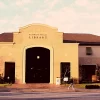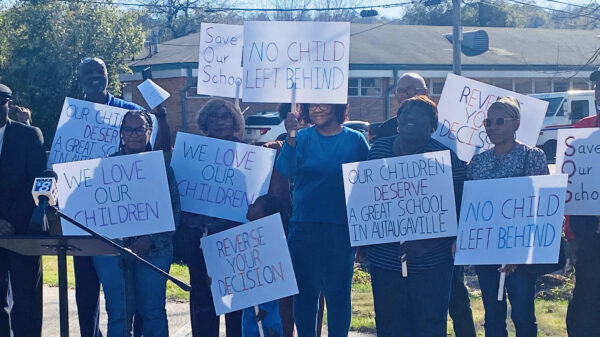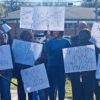|
Getting your Trinity Audio player ready...
|
The culture war continues in Prattville over whether certain books belong in the children’s and young adult book sections of the Autauga-Prattville Public Library.
The group now has a webpage dedicated to the book challenges, and are recruiting members to help negatively review books that they find inappropriate.
Angie Hayden, a Prattville mother with a gay daughter, has been one of the most vocal supporters of the library during the fight, and told the Prattville City Council on Tuesday that her husband Seth had sent his information in to join as a book reviewer.
The emails he received in response shows how the group is coordinating to submit a large number of books for consideration before the library board’s next meeting.
The first email, attributed to a woman named Grace Kajdos, assigns two books to Seth to review: Magical Boy by the KAO and Nothing Burns as Bright as You by Ashley Woodfolk.
At the same council meeting Tuesday, several citizens came before the council once again to complain about the books at the library for sexually explicit content, but some citizens also complained about books being “pro-gay,” “anti-Christian,” and “pushing radical gender ideology.”
Meanwhile, the emails to Seth Hayden not only assign the books to be reviewed, but further instruct on what verbiage to use.
“Please use words and phrases that are used in the Alabama Anti-Obscenity Act and the Children’s Internet Protection Act,” the email states.
The most relevant section of the state’s anti-obscenity act is a section on “material harmful to minors,” although the exact application of that statute is murky at best.
The section states, “It shall be unlawful for any person to knowingly or recklessly distribute to a minor, possess with intent to distribute to a minor, or offer or agree to distribute to a minor any material which is harmful to minors.”
The definition of “harmful to minors” earlier in the same section reads, “a. The average person, applying contemporary community standards, would find that the material, taken as a whole, appeals to the prurient interest of minors; and
“b. The material depicts or describes sexual conduct, breast nudity or genital nudity, in a way which is patently offensive to prevailing standards in the adult community with respect to what is suitable for minors; and
“c. A reasonable person would find that the material, taken as a whole, lacks serious literary, artistic, political or scientific value for minors.”
That three-prong test is similar to a standard of obscenity set by the U.S. Supreme Court in Miller v. California, the predominant test used to determine whether expression constitutes obscenity.
Certain sexually explicit descriptions could potentially fall under this definition—any argument that a book contains “pro-gay” or “anti-Christian content, or content promoting “radical gender ideology” would almost assuredly not be considered obscenity.
However, the Alabama state legislature has made this definition’s intent and future intent even murkier with recently considered legislation.
A bill by Rep. Arnold Mooney, R-Indian Springs, would not make any real changes to the definition of “material harmful to minors” itself, but could drastically change the definition of sexual conduct under the law. “Sexual conduct” is a part of the definition of “harmful to minors,” thereby changing the scope of what material could be considered harmful to minors.
Mooney’s bill would broaden he scope of sexual conduct to include “any sexual or gender oriented material that exposes minors to persons who are dressed in sexually revealing, exaggerated, or provocative clothing or costumes, or are stripping, or engaged in lewd or lascivious dancing, presentations, or activities, including but not limited to topless, go-go, or exotic dancers, or male or female impersonators, commonly known as drag queens or drag kings.”
If applied to reading material, the definition could be wielded against books that deal with transgender characters or drag queens.
So far, the Prattville City Council or the Autauga County Commission have not gotten involved to remove the books. The library board has also made minimal changes to the books, although library staff did move some books behind the counter, citing a “hostile environment” around the books.
Since the book challenges began, director Lindsey Milam resigned from her position at the library. Andrew Foster officially began his tenure as the director fo the library on Wednesday.
The Prattville City Council continues to allow public comment at the end of its meeting, which is almost entirely dominated by discussion of the library, but made a change to its procedure Tuesday to no longer allow reading of excerpts from materials that are not included in the council’s agenda.
Mayor Bill Gillespie said he was “red-faced” over some of the excerpts that were read in the prior council meeting, and said that the council chamber is no place for the reading of such material which “crossed several lines of decent public comments.”
“To me, decent public comments are conforming with general accepted standard of respectable moral behavior,” Gillespie said. “This creates a very difficult work environment.”
Citizens in favor of removing or reclassifying the books said that they, too, are embarrassed of the language, but said that is why they don’t believe it should be in the children’s or “young adult” section of the library.
Prattville resident Mary Ellen Johnston told the council she read three books from the library in the young adult fiction section, which led to her feeling “very discouraged.”
“What I found in these—that I read completely—is a subtle agenda: pro-gay, anti-Christian,” Johnston said. “Their theme is ‘Make your own rules; whatever feels good, do it.’ They’re racially divisive.”
Prattville resident Jay Jusino compared the books in the library to a list of 45 communist goals entered into the Congressional record in 1963 including “eliminate all laws governing obscenity by calling them censorship and a violation of free speech and free press” and “break down cultural standards of morality by promoting pornography, obscenity in books, magazines and more.”
Allan Bledsoe, pastor of First Presbyterian Church of Prattville, came before the council to raise concerns about a book titled “My Rainbow” that the publisher recommends for 4-year-olds.
“The book teaches that if you’re a boy, and you feel like it, you can become a girl,” Bledsoe said. “Can we not say what we all know? This is preposterous. It is woke indoctrination of the children of this community with radical gender ideology that destroys lives.”





















































